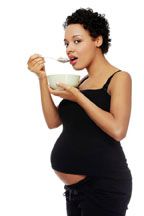Quiz – Safe Eats For Mama & Baby
Nutrition, hydration, and appropriate weight gain are essential for a healthy pregnancy, and while there are a few things an expecting mom needs to add or supplement to her diet, there are also some things she should avoid. What’s on and off mama’s menu for nine months? Take our quiz to learn more:
1. Folic acid is a nutrient that women of childbearing age should have daily before they try to conceive.
A. True
B. False

2. To maintain a healthy pregnancy, an average of ___ extra calories are recommended daily.
A. 150
B. 300
C. 450
D. 600
3. Listeria, a type of bacteria that can contaminate deli meat and unpasteurized dairy foods, can cross the placenta and lead to infection.
A. True
B. False
4. All of the following foods should be avoided by pregnant women EXCEPT: 
A. Fish with mercury
B. Refrigerated smoked seafood
C. Salmon
D. Pate and meat spreads
E. Raw eggs
5. No amount of caffeine is safe during pregnancy.
A. True
B. False
6. A safe amount of alcohol for pregnant women to consume in a week is about ___ ounces.
A . 12
B. 5
C. 1.5
D. Zero
.jpg?sfvrsn=a7b7ddbe_1)
Answers:
1. A. True. Folic acid can be found in some green leafy vegetables, most berries, nuts, beans, citrus fruits, fortified breakfast cereals, and some vitamin supplements. It can help reduce the risk of certain birth defects, and is most helpful during the first 28 days after conception.
2. B. 300. The extra calories should come from a balanced diet of protein, fruits, vegetables, and whole grains, with fats and sugars kept to a minimum.
3. A. True. Pregnant women should avoid hot dogs and deli meat, as well as unpasteurized milk and soft cheeses like feta, queso blanco and fresco, and brie.
4. C. Salmon. Cooked salmon is rich in beneficial omega-3 fatty acids and vitamin D, and does not have the dangerous levels of mercury in some other fish or the risk of listeria in some smoked seafood.
5. B. False. A restricted intake may be permissible, but a woman should talk with her doctor about potential risks. Caffeine used during the first trimester or in large amounts has been associated with miscarriage and premature birth in some studies. Fluid intake is an important part of healthy pregnancy nutrition, while caffeine acts a diuretic, contributing to the elimination of fluids.
6. D. Zero. No amount of alcohol is safe during pregnancy. Prenatal exposure to alcohol can lead to developmental disorders including fetal alcohol syndrome. Avoid all alcohol immediately if you learn you are pregnant.
Check out our Health Library for answers to all kinds of health-related questions.